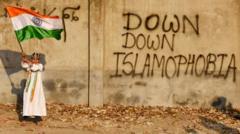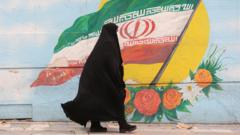A recent incident in Moradabad reveals deep-seated religious divides within Indian society as a Muslim couple is forced to sell their new home following protests from local Hindu residents who oppose their presence in the neighborhood.
**Increasing Religious Polarization in India: Muslim Family Evicted Amid Protests**

**Increasing Religious Polarization in India: Muslim Family Evicted Amid Protests**
Religious tensions rise as a Muslim couple is driven out of their home in Moradabad due to opposition from Hindu neighbors.
A Muslim couple in Moradabad, India, is facing backlash after purchasing a home in TDI City, a posh residential area, due to protests from their Hindu neighbors. The protests erupted after news of the sale surfaced, with residents vocally opposing the couple living near a local temple, citing concerns for community safety and asserting that the sale should be rescinded. “We cannot tolerate a Muslim family living right in front of our local temple,” voiced protester Megha Arora, calling for the administration to cancel the registration of the house to the Muslim couple.
This being a sensitive issue in India, where communal tensions sometimes simmer beneath the surface, the protest gained traction and soon prompted a visit to the district magistrate's office by residents hoping to voice their concerns. Following these protests, previous homeowner Dr. Ashok Bajaj, an eye surgeon and longtime resident of the neighborhood, announced a mediated resolution where the Muslim couple would sell the house back to a Hindu family, citing discomfort that arose from the backlash.
Dr. Bajaj noted that he did not expect the sale would trigger such national outrage and indicated that the Muslim couple had familial ties to his family extending over 40 years. The protests have raised alarms among observers who highlight increasing incidents of discrimination against Muslims in India, especially under the current Hindu nationalist government led by Prime Minister Narendra Modi. Even in urban settings, social segregation remains prevalent, with housing societies often excluding minority communities through discriminatory practices related to religion and dietary habits.
Tanvir Aeijaz, a political scientist at Delhi University, suggests that this incident reveals broader societal polarization, asserting, “Denying the Muslim couple the choice to buy the house they wanted is discriminatory and completely unconstitutional.” The social media response to the incident amplified calls for change, with commentators expressing their outrage at the unfolding events and the broader implications for religious tolerance in India.
Critics of the current climate in India argue that it gravely endangers the constitutional rights of individuals, especially minority communities. The rising tension not only threatens community cohabitation but also reflects broader societal divisions. In light of the controversy, many believe that a commitment to pluralism and acceptance is essential to combat the hate mentality that has gained a foothold in various areas of Indian life. Despite the current atmosphere, Professor Aeijaz expresses cautious optimism, citing Hinduism's roots in pluralism as a potential counter to the present divisiveness.




















